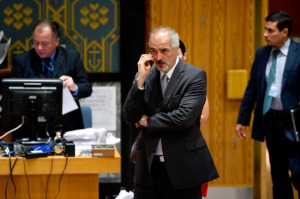In accordance with United Nations Security Council Resolution 2118 which provides a framework for putting the Syrian chemical weapons under international control and and the further elimination of those, the first phase which implies the elimination of the main facilities that can manufacture or mix chemical substances or produce ammunition for those has been successfully completed. Both the UN and the Organization for the Prohibition of Chemical Weapons (OPCW ) say that the Syrian authorities have shown a good level of cooperation and communication in the process. The next meeting of the representatives of all the concerned parties which are Russian, the United States , OPCW, UN and Syria is due to take place in Moscow on December 27 of this year.
To date there’s been a significant number of countries that took part in the practical implementation of United Nations Security Council Resolution 2118. At this stage – Russia and China are playing a leading part in the process of the Syria’s chemical stockpile elimination. These two countries have taken the responsibility of providing military escort to the cargo vessels that should take chemical substances from Syria to Italy. The Denmark and Norway ships will be used for transporting these substances and from there the American Cape Ray vessel will take the Syria’s WMD aboard and neutralize the components used in it’s deadly cargo.
According to the OPCW road map, the most dangerous chemical substances will be moved out from the Syrian territory by the end of this year. The rest will be sent for processing no later than 30 June 2014.
The fact that the Syrian chemical programme was put under the international control and the subsequent liquidation of its chemical substances did certainly helped in preventing the military foreign intervention of Syria. It took a lot of effort to prevent these weapons from ending up in the hands of terrorist groups.
However, these steps are ambiguously perceived by the enemies of Syria, who continue with countless provocations and numerous attacks carried out by the armed opposition destabilizing the Syrian Arab Republic. On top of all these underhand practices disrupt the efforts taken by the international community in order to ease the ferocity of the civil war in order to convene a peaceful conference on Syria – “Geneva -2 .” In this context, the rebel attack on the Syrian chemical depots that took place on December 21 can easily be regarded as yet another link in the long chain of provocation activities that aimed at disrupting the schedule of the UN Security Council Resolution 2118, which would give the militants a chance to accuse Syrian authorities then in breaking the deal.
However, despite the fact that the militants used vehicles mounted with machine guns to capture the chemical storage in Homs, their attack was repulsed by the Syrian army.
But it was not the only provocation , there was yet another attack that took place in the vicinity of Damascus, when the terrorists tried to breach a military facility perimeter using armored vehicles and “tons” of explosives This attack was prepared and carried out by the militants of the Liwa al-Islam and Al-Nusra front. As a result 4 people were killed and 28 more injured.
Based on the results of the ongoing fight against terrorism , Damascus blames these attacks on the countries that are “well-known for their support for terrorist organizations” which should have hinted the militants about the whereabouts of the Syrian chemical weapons . Syria ‘s Foreign Ministry indicated that the terrorists were not acting at random, they planned everything beforehand which implies the involvement of external “sponsors” who have had the access to information known only by the OPCW members. In these circumstances, the position taken by the OPCW can be hardly comprehended , since they are rejecting any attempt to ensure proper security of the WMD transportation, even though it can lead to further expenses. For instance the trucks can be covered with armored sheets which takes time and money but it would really be handy in the present situation.
The ongoing discussions of this issue in the local and international media shows that there’s a short list of countries that may be guilty of these provocations. These are Saudi Arabia, United Kingdom, France and the United States . There’s a number of reason why these countries go in the specified list , such as the support they showed to the armed militants in Syria , they were supplying the latter with weapons and providing them with instructors for “training”, some of which were employed by the British , American and French intelligence services .
However, such short-sighted policies do not simply lead to the escalation of a military conflict in Syria and the death of thousands more civilians. Such actions taken by the “sponsors” increase the risks of growing radicalism and extremism among their own respective populations. When the military conflict in Syria will be all but over the prodigal sons of these countries will make a good use of the skills they have acquired in the terrorist ranks fighting against the Syrian army. This fact is already confirmed by the recent reports by Sky News, that investigate the nature of the British jihadists fighting now in Syria , whose number now is about 200 militants.
Given these circumstances, we can not exclude the occurrence of the new provocations inspired by the “sponsor states” that are aimed at disrupting the international efforts in Syria . This means that the people around the world should keep a wary eye on the events that are taking place in Syria, since the restless “sponsors” are seeking any means to disrupt the peaceful initiatives in that country.
Vladimir Odintsov, political commentator, exclusively for the New Eastern Outlook online magazine.

